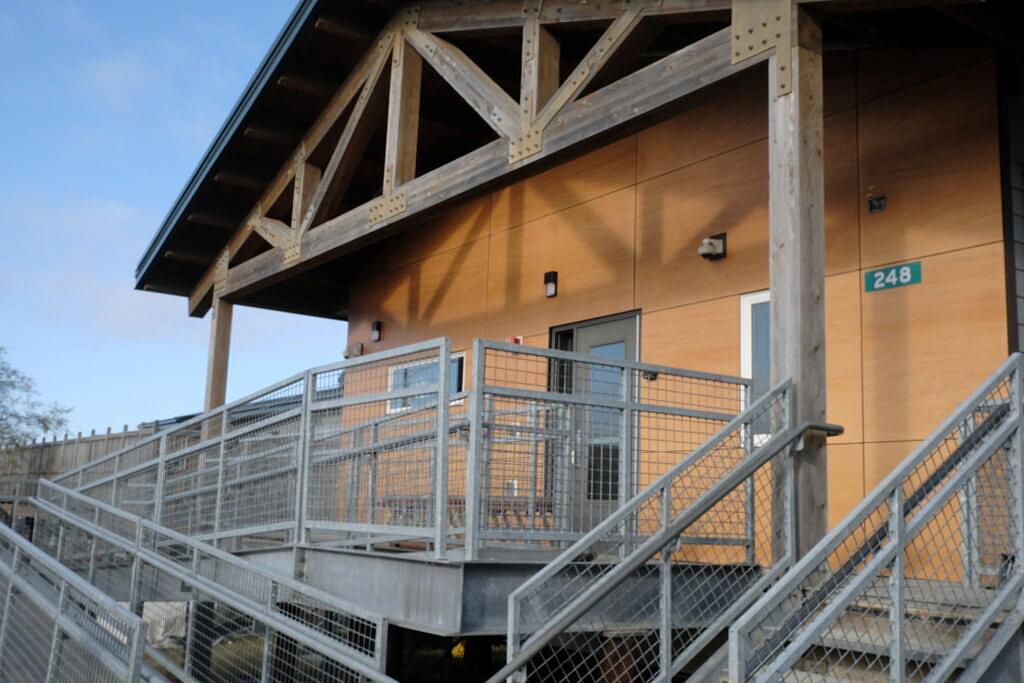Housing vouchers free up space in Bethel’s domestic violence shelter
The story was originally published by Alaska Beacon with support from our 2023 Domestic Violence Impact Fund

Tundra Women’s Coalition, the domestic violence and sexual assault shelter in Bethel, is seen in the afternoon light on Oct. 11, 2023.
Photo by Claire Stremple/Alaska Beacon
In Bethel, as with communities throughout the state, affordable housing for survivors of domestic violence is hard to find, especially for people who travel from smaller villages to access services at the shelter.
This last year, for the first time, the state’s housing program had housing vouchers for the Bethel domestic violence shelter. The shelter placed more than 50 people in housing — roughly 20 families — and was able to provide emergency shelter to more people as a result.
Taylor Feightner, the director of services for Tundra Women’s Coalition, said the vouchers have been a huge success.
“These resources have never been available in a community like Bethel before,” they said. “So it’s just nothing but concrete, amazing, empirical data that says: This is what people need, and this is how we help people.”

Homes are seen in Bethel on Oct. 12, 2023.
Photo by Claire Stremple/Alaska Beacon
The vouchers are from the state’s Stabilization and Recovery Program, administered by the Alaska Housing Finance Corp. The funding will expire in 2025, but until then the program uses federal money from the COVID-19 pandemic to house people who are living in shelters, sleeping outside or are victims of domestic violence or trafficking.
The program covers housing for a year. Bethel received access to funding for roughly 70 households through the stabilization grant last year, according to an AHFC spokesperson.
Eileen Arnold, the shelter’s director, said the vouchers have helped rehouse people from the shelter quickly. “They’re not stuck in a shelter for like six months, nine months,” she said. “We’ve been able to provide more shelter nights, and more individual people have utilized shelter.”
In the 2023 fiscal year, the shelter was able to provide 11,651 nights of shelter, roughly 1,000 more than the previous year.
Housing in Bethel
There is some affordable housing available in Bethel. AHFC operates 117 units of public housing there, and Tundra Women’s Coalition clients have priority for those units. There is more to come, too. In late 2024 Bethel Housing First plans to open another 24 units of affordable housing, and AHFC is managing the grant funding for that project.
Instead of going back to repeat the cycle, they could have their own place. Vouchers help especially single moms who just need that little extra boost of security for the first couple of months for them to get on their feet.
– Nakissha Bialy, Tundra Women's Coalition
Nakissha Bialy manages the housing program and said if you are not in one of those units, it can be hard to find an affordable place to live — rent in Bethel can run between $1,600 and $2,800 a month for a two-bedroom, she said, adding that those prices don’t include utilities.
“A lot of the time, our clients here come from the village with no work experience, no savings — or they have debt, or they come here to get a job — they just don’t have enough to get a place. So that gives them about a year to save up and prep,” she said.

Yvonne Aloralrea, CJ Pleasant and Nakissha Bialy pose for a photograph inside the Tundra Women’s Coalition, where they work, on Oct. 11, 2023.
Photo by Claire Stremple/Alaska Beacon
She said it is especially hard for people with children to find work because child care is limited and expensive.
Bialy has worked for the Tundra Women’s Coalition on and off for the last 15 years, and said the vouchers have helped the coalition realize its mission of keeping people safe from violence.
“I’ve never seen anything like it,” she said. “Instead of going back to repeat the cycle, they could have their own place. Vouchers help especially single moms who just need that little extra boost of security for the first couple of months for them to get on their feet.”
By AHFC’s count, there is funding for about 28 more households to utilize the program. After that, the shelter will have to look for new ways to finance housing solutions for its residents. AHFC has no plan for what would replace the program, but a spokesperson acknowledged its success and said that the organization is hopeful more federal funds could become available in the future.
The shelter doesn’t have the funds to replace the program either.
“Obviously, in theory, we would like to continue this program,” Eileen Arnold said. “But without state or federal funds, it won’t be possible. We operate on a shoestring budget.”


